- Home
- Karen Marie Moning
Feverborn Page 14
Feverborn Read online
Page 14
“Alina!” I roared again, crashing into a locked door, blasting my way through it. Hall after hall. Door after door.
Until finally she was trapped. She’d locked herself in one of the back bedrooms, one door between us and no way out for her. I could hear her sobbing on the other side.
What the hell was the Book playing at?
I kicked the door in with perhaps more violence than was strictly necessary.
She screamed and wrapped both arms around her head. Rolled over and puked violently.
I took a step closer and she screamed again, as if in soul-rending pain.
I stood and stared, trying to make some sense out of what was happening.
“Please,” she whimpered. “Please. I don’t…want you. I’m not…looking for…you. I’ll…go home. I’ll…leave.”
What the hell?
“We’re ending this now,” I snarled.
“Please,” she cried. “No!” She unwound one arm from her head, raised it, shaking as if to ward me off. “Darroc!” she screamed. “I need you!”
“Darroc is dead,” I said coldly. “And so are you.”
On the floor, huddled in a ball, my sister screamed and screamed.
—
I ended up leaving.
I couldn’t take it one more second. What was I going to do? Kill the illusion of my sister?
I spun on my heel and stomped down the stairs, hands thrust into my pockets, head down. With the scent of lavender Snuggle sheets in my nostrils.
I grabbed the doughnut on the way out. It was in a bag, sitting near the vase of dusty flowers on the table.
I took the coffee next to it, too.
With the coral-pink lipstick on the rim, precisely the shade my sister wore: Summer Temptress.
I figured I might as well enjoy the happy parts of my madness if I had to stomach the bad.
Munching a soggy cruller (they may have gotten the right supplies but certainly weren’t professional bakers—then again, if this was all an illusion, why wasn’t my doughnut stellar? Was I so self-sabotaging I screwed up even my own illusory treats?), I ignored the mirrors I passed and forgot entirely about the blasted dolmen until I was nearly back to the intersection where I’d left the Hunter.
Of course, it wasn’t there.
I tapped my foot irritably, cracking the thin layer of black ice sheeting the pavement.
And felt utterly lost.
I’d just seen the impossible. Confirming my fear that I might truly be stuck in an illusion I’d never escaped.
But other details, like the imperfect doughnut, the half-warm coffee (with heavy cream, no sugar, just the way my sister liked it), the sheet of ice on the pavement, all hinted at a cohesive reality.
This was what I’d been doing for months now, constantly assessing everything around me, trying to ferret out the Ultimate Truth.
Had Barrons really shouted me out of my illusion that night in Barrons Books & Baubles when (I believed) I’d seen through the projection of Isla to the reality that Rowena, possessed by the Sinsar Dubh, was trying to trick me into giving her/the Book my amulet by masquerading as my biological mom? Perhaps the illusion the Book had woven for me that night had never stopped.
Had I really helped lay the Sinsar Dubh to rest in the abbey, then watched it get absorbed by Cruce, then seen Cruce locked up?
Or had I never escaped the Book’s clutches?
That was the motherfucking question.
The worm in my apple.
Something had happened to me that night that made me begin to deeply question the nature of my reality. Being deceived so thoroughly—even if only for a finite time—made me wonder if I was still being deceived. Somedays I got by fine. Accepted that I’d made it. Saw only consistency in the world around me.
But some nights, especially those nights I dreamed the hellish song I’d been hearing lately, I wondered if something was trying to break out of my subconscious into my conscious mind that I couldn’t quite bring to the surface and it—whatever it was—existed on the opposite side of an illusion the Book had woven for me.
Plans kept me sane. Obsessively hunting the Unseelie king to get him to remove his Book had kept me focused.
Focus prevented me from stretching out on a sofa somewhere and just giving up because I couldn’t decide upon a satisfactory way to prove to myself that the reality I was living was real.
My fake mom and dad, Pieter and Isla, had seemed utterly real, too.
Now Alina.
But the Alina situation was odd.
With all kinds of wrong details. The glittering diamond on her wedding finger. Sobbing, hiding from me. Screaming if I got too close. Crying out for Darroc.
Alive.
Not.
I pressed my fingers to my temples and rubbed. “Focus, focus, focus,” I muttered. “Do not take a single illusion as a sign that everything is. That doesn’t necessarily follow. You’re in the right reality. You defeated the Sinsar Dubh. Alina is the only illusion.”
But why?
Having something inside me that was capable of weaving the convincing illusion the external Book had crafted, then having it go suddenly silent, was worse than it taking jabs at me and me snapping Poe back at it. At least our inane and bizarrely harmless spats had been something concrete I could hold on to. I’d been almost relieved when it made me kill Mick O’Leary.
Because at least then I’d been able to say: Oh, so that’s its game. I’ll just never use my spear again. I’m in my reality. This is it. I understand.
I’d told Barrons none of this. I’d hidden it from everyone.
I’d been grateful to vanish.
I couldn’t shake the feeling that even if I was in the right reality, the Book was even now spreading nooses around me everywhere, and the first misstep I made, it would jerk that rope tight.
I stared down the empty street, littered with debris and dehydrated human husks blowing like sad tumbleweeds across the cobblestones.
“Not wishing,” I growled. “I don’t want to be invisible.”
I wanted to feel like myself again. I desperately craved certainty in my soul. I was appalled to realize I’d almost given up. Withdrawing from Barrons, rarely pausing in my search for the king those weeks after I’d killed (or had I?) Rowena, not even to have sex, detaching from my parents.
But Barrons and Unseelie flesh had stirred fire in my belly again. Fire I needed.
I resolved to eat Rhino-boy and fuck constantly until I figured out this crisis of faith.
Toward that end, I needed a sifter.
Where the bloody hell was I going to find a sifting Fae?
—
“Christian,” I said, smiling. “I thought I’d find you here.”
“Mac,” he said, without lifting his eyes from the cut-crystal glass of whiskey in his hand.
I dropped down on a stool next to him at what had once been the Dreamy-Eyed Guy’s bar, then mine for a time.
The Sinatra club in Chester’s was one of the quieter ones, where human males gathered to discuss business and, on rare occasion, some freakish Unseelie took a table for a time. This subclub drew a more refined clientele, and the Fae were all about the unrefined. The more brassy, sexual, and desperate tended to catch their eye.
I gave him a once-over. Hot, sexy Highlander with strange eyes I was grateful were currently brooding into his drink, not turned on me. Something was different. He looked awfully…normal. “Where are your wings?” I asked.
“Glamour. Bloody women in this place go nuts if I show them.”
“You can sift, can’t you?”
“Aye. Why?”
“I was hoping you’d take me somewhere.”
“I’m not moving from this stool. That fuck Ryodan lied. He said he tried to bring Dageus’s body back to us but he didn’t. He doesn’t know that I know the man he brought us was from Dublin, not the gorge at all. He must have snatched a bit of plaid from our rooms upstairs and bloodied it up. Why would he giv
e us someone else’s body, Mac?”
I rapped the counter sharply, ordering a drink. I raised my whiskey when it came as if to make a toast. “Sounds like you have a mystery. I’ve got one of my own. What do you say you help me solve mine and I’ll see what I can do about solving yours?”
He turned his head slowly and looked at me.
I dropped my gaze instantly.
He laughed softly. “That bad, Mac?”
I inhaled deeply and snatched a quick glance from beneath my lashes. I’d seen this look before, times a thousand, as I rolled in the Unseelie king’s great wings. I lowered my gaze again and steeled myself. Then looked up and straight at him, right in the eyes.
For about two seconds.
“Not bad, Christian,” I said, looking down at my drink. “Just different. Intense. Like looking up at stars. We’ll get used to it.” I paused then added, “You know I can get into more places in this nightclub than you can. I can keep an eye out. Go poking around later tonight, see if I can learn anything about your uncle.”
I had no intention of telling him. My loyalty is one hundred percent to Barrons. Period. The end. That is one of the few things I’m absolutely certain about anymore. Our bond. Our two-person religion. But I would certainly see if I could get Barrons to get Ryodan to consider letting Christian know. At some point. I knew what it felt like to lose family. I’d blamed myself a dozen different ways for all the things I hadn’t done that might have saved Alina. I could only imagine how badly Christian was blaming himself for his uncle’s death.
After a measured pause, he clinked his glass to mine. “Perhaps we can be of use to each other. You should know, lass, I’m far from a pro at it. It was easier before my stay on those cliffs.”
“Because you didn’t turn full Unseelie?”
“Aye. I suspect. I can do it, but it’s more difficult. I tend to give myself a wide margin. Where is it you’re wanting to go?”
14
“I am stretched on your grave and will lie there forever…”
Ashford, Georgia: population 3,979, covering 8.9 square miles, boasting over 100 original antebellum homes, housing 964 families. It’s nestled in the prettiest part of down-Dixie I’ve ever seen.
Of course, I may be biased.
I love every nook and cranny of my town.
I’d not only toured all the historic homes decorated from pillars to eaves at Christmastime—Alina and I loved the holidays—but we’d practically lived in those atmospheric old homes on sultry afternoons and weekends, hanging out with our friends on bead-board-ceilinged porches with slow paddling fans, on white wicker swings, drinking sweet tea and believing nothing would ever change.
I’d eaten in every quaint restaurant and partied in every bar. I’d attended prom at the local high school and gone to concerts on the square. I knew every shop owner, and was evenly moderately acquainted with the politics of the region.
Given the size of my town, one would think it boring, filled with average people living moderately, but with its rich history, expensive, sprawling historic homes, and easy access to Atlanta, Ashford drew a lot of high-powered transplants from large, exciting cities—like my parents, who were seeking a simpler way of life yet enjoyed the finer things.
Mom and Dad bought a 1905 neoclassical revival mansion that had fallen into disrepair, surrounded by old, enormous wax-blossomed magnolia trees, and had lovingly restored it over the years. It boasted a typically southern, generous front porch, palatial white columns, an expansive yet warm and cozy sunroom off the back, and, of course, the pool I’d so enjoyed in the backyard. It was an idyllic, happy, safe place to grow up. Crime was virtually nonexistent in our town.
The Ashford cemetery occupied twenty-two acres, with a large Confederate memorial full of unknown soldiers, a few smallish mausoleums, manicured gardens, well-maintained walkways, and a tiered fountain.
It seconded as a park for the locals, with its gently sloping hills, flowering bushes, and crisp, cool lake on the back acreage. On the weekends you could find half the parents in town power-walking through gravestones. Divided into sections: the old cemetery, the new, and the memorial, we’d had Alina interred on the south side, in the modern portion, with a lovely marble marker.
It was late afternoon when Christian and I arrived in Ashford, or rather near Ashford. It had taken me hours to sneak back to Chester’s dodging every person and Fae I saw, ducking into doorways to avoid Guardians, once, reduced to hiding in a trash Dumpster. Between my recent shock and my face plastered everywhere around the city, I’d been in no mood for confrontation. Near Chester’s, though, I’d been unable to avoid it and tested my skill at Voice that Barrons had taught me, for the first time on strangers. It worked beautifully. They obeyed me instantly, turning around and heading the other way. My hastily shouted, And don’t breathe a word about seeing me to anyone. Forget everything about this day forever! hadn’t necessarily been the wisest choice of words, but I was operating on the fly. I hated the thought of people walking around out there with a whole day missing from their memory. I knew what it felt like to lose time, Pri-ya, to question your own mental faculties, and resolved to be more precise in the future.
Christian had been telling the truth about his sifting abilities. I think part of the problem was he’d never been to the States before. The other Unseelie hadn’t exactly volunteered information about his new powers. He was an outsider to both races. Everything for him was trial and error. He frankly admitted he had no clue how he was “supposed” to sift. Places he’d been were the easiest. He hadn’t yet figured out tracking by person but heard he was capable of it.
We’d had to stop first at BB&B, an easy sift for him, where I rummaged for a map in the wreckage and showed him where I wanted him to take me. As there was no detailed topography of the town—it was far too small for that—we ended up smack in the middle of a cornfield and had to walk twenty minutes to get to the cemetery. By the time we arrived, I was dripping sweat. Just another hot August day in Georgia: sun scorching, humidity thick.
He’d offered to try to sift us closer but we materialized alarmingly near a colossal live oak dripping Spanish moss—as in half an inch from the massive trunk. While he might survive manifesting in the middle of solid wood, I wasn’t so sure about myself, so I’d opted to use my feet from there. I had a good deal of nervous energy to burn off anyway.
“Why are we here again?” he said.
“I want to check on something,” I muttered. I hadn’t bothered to tell him that I planned to dig up a grave. I wasn’t entirely certain he would have complied with my request for transport.
I glanced over my shoulder. He was trailing behind, looking at everything.
“Christ,” he said, sounding disgusted, “everything is so new here.”
I would have laughed if I hadn’t been in such a pissy mood. I’d always thought my town dripped history but ours was a few hundred years old, and in Scotland his was a few thousand. I guess when you grow up with prehistoric standing stones in your backyard, American towns seemed prepubescent.
I was pleased to see that V’lane/Cruce’s protection of Ashford when the walls had fallen had indeed kept it remarkably unchanged. Lights glowed in windows, there were no wrecked cars blocking the streets or signs of random rioting and carnage. No Dark Zones, no Unseelie lurking in the alleys, not one husk of the dead tumbling down desolate streets.
I supposed it was pretty much the way it had been before the walls fell—my town was too provincial and unexciting to draw the Fae.
It was as if the war between our races had given the place as wide a berth as Sherman’s armies when the troops made the devastating march from Atlanta, after burning it to the ground. Although Ashford hadn’t been torched by Sherman’s marauding army determined to “make Georgia howl,” half the town center burned to ash in the late 1890s, and they’d rebuilt it with a plan for revenue, planting a large number of shops and restaurants arranged around an enormous, beautifully landscaped squar
e.
We passed the Brickyard where I used to bartend.
I barely spared it a glance.
My head was jam-packed with images of my dead sister, curled on the floor, screaming. Afraid of me. Crying out for Darroc.
It was too much to deal with. It was one thing to see an illusion of my dead sister, another to see her apparently terrified of me for some reason. That moment when her joy had turned to horror was scorched into my brain, eclipsing all my good mental photographs of her.
What sadistic game was the Book playing?
“See that hardware store?” I said to Christian, pointing. It was open for business, I supposed on the barter system, but I was in no mood to see anyone I knew. “Can you sift in and grab me a shovel?”
He shot me a look that couldn’t have more plainly said, What the bloody hell do you think I am? Your little fetch-it boy?
“Please,” I added. “And make it two.”
One brow arched. “You think I’m going to dig?”
“I was hoping.”
“You do know I can simply make the earth move, Mac. Even as a mere druid, I had that much skill. What do you want moved?”
“Silly me,” I said dryly. I’d not even considered that Christian was the Bewitched I’d teased Barrons about being. Truth was, I’d rather been looking forward to some physical labor. That damn steam I needed to burn off.
“Come on,” I said, sighing. “The cemetery’s this way.”
“Great. A bloody cemetery,” he said, and matched my sigh. “I’m never going to get away from Death.”
—
There were no flowers on my sister’s grave. My town puts plastic bouquets everywhere in the cemetery, which is attractive from a distance but I always thought was kind of gruesome close up. Embalmed blossoms for embalmed people.
I paused at the foot of her grave and closed my eyes. It was over a year ago I’d stood here in the pouring rain, matching it tear for drop, trying to make sense of my life, trying to envision a future—any kind of future—for myself without her.
If I’d known back then how much worse it was going to get, I might have stretched on her grave and never gotten up.

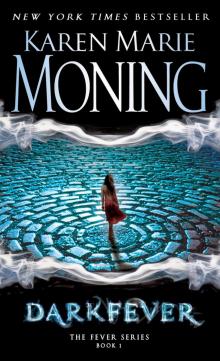 Darkfever
Darkfever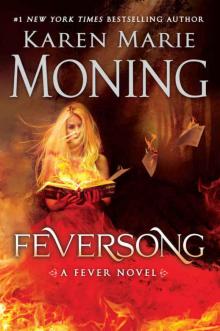 Feversong
Feversong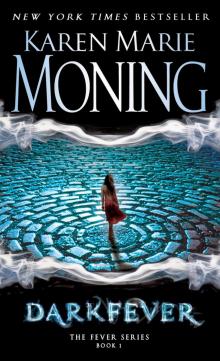 Faefever
Faefever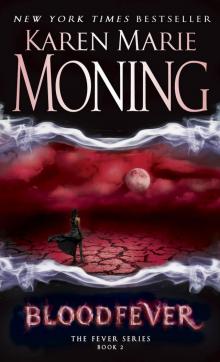 Bloodfever
Bloodfever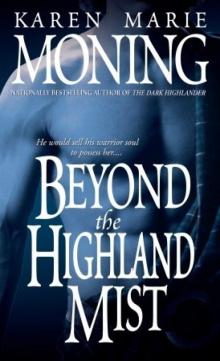 Beyond the Highland Mist
Beyond the Highland Mist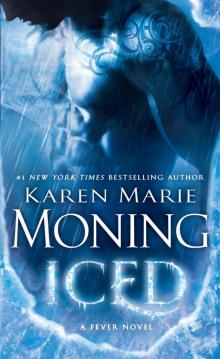 Iced
Iced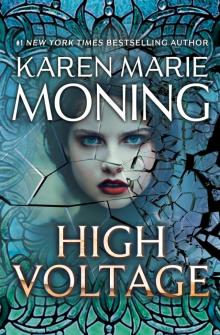 High Voltage
High Voltage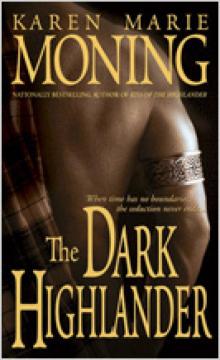 The Dark Highlander
The Dark Highlander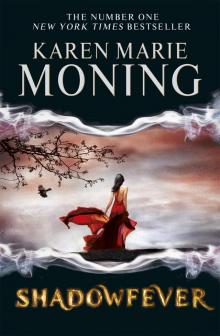 Shadowfever
Shadowfever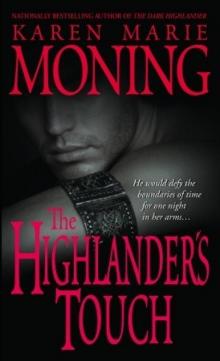 The Highlander's Touch
The Highlander's Touch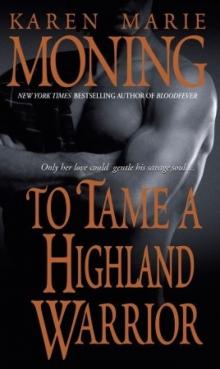 To Tame a Highland Warrior
To Tame a Highland Warrior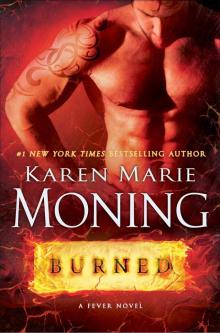 Burned
Burned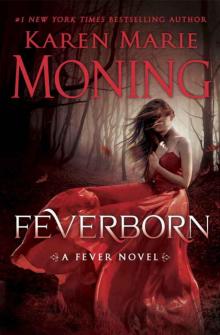 Feverborn
Feverborn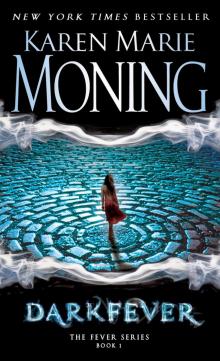 Dreamfever
Dreamfever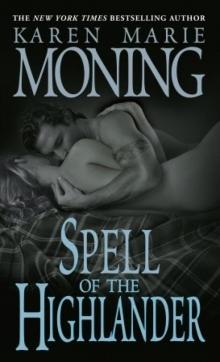 Spell of the Highlander
Spell of the Highlander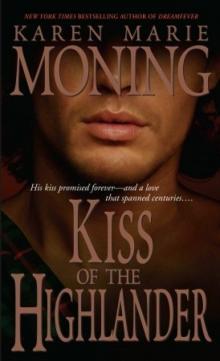 Kiss of the Highlander
Kiss of the Highlander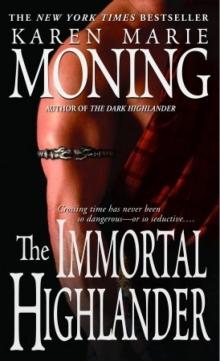 The Immortal Highlander
The Immortal Highlander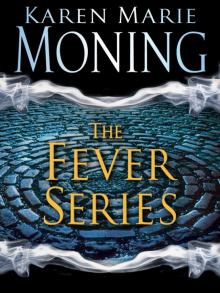 Karen Marie Moning’s Fever Series 5-Book Bundle: Darkfever, Bloodfever, Faefever, Dreamfever, Shadowfever
Karen Marie Moning’s Fever Series 5-Book Bundle: Darkfever, Bloodfever, Faefever, Dreamfever, Shadowfever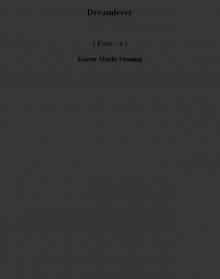 Dreamfever f-4
Dreamfever f-4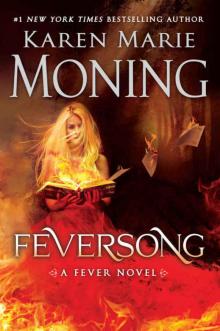 Feversong: A Fever Novel
Feversong: A Fever Novel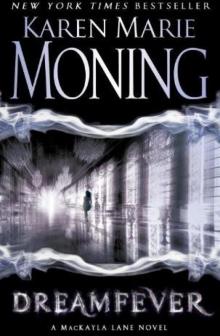 Dreamfever_The Fever Series
Dreamfever_The Fever Series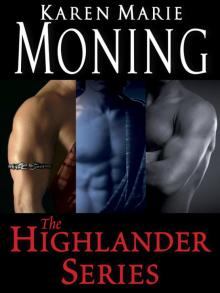 The Highlander Series 7-Book Bundle
The Highlander Series 7-Book Bundle![[Highlander 04] - Kiss of the Highlander Read online](http://i1.bookreadfree.com/i1/03/29/highlander_04_-_kiss_of_the_highlander_preview.jpg) [Highlander 04] - Kiss of the Highlander
[Highlander 04] - Kiss of the Highlander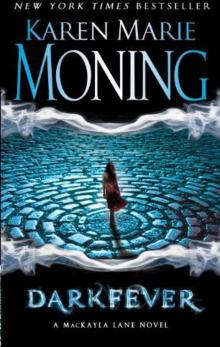 Darkfever_The Fever Series
Darkfever_The Fever Series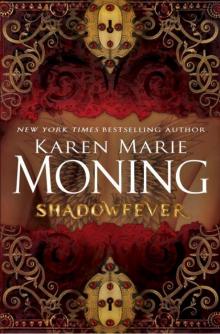 Shadowfever_Fever
Shadowfever_Fever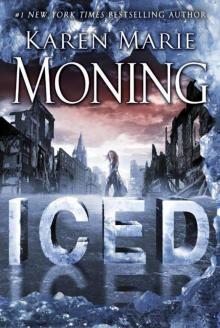 Iced: A Dani O'Malley Novel (Fever Series)
Iced: A Dani O'Malley Novel (Fever Series)![Fever [08] Feverborn Read online](http://i1.bookreadfree.com/i2/04/09/fever_08_feverborn_preview.jpg) Fever [08] Feverborn
Fever [08] Feverborn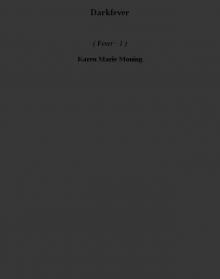 Darkfever f-1
Darkfever f-1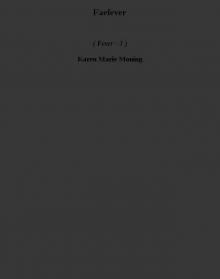 Faefever f-3
Faefever f-3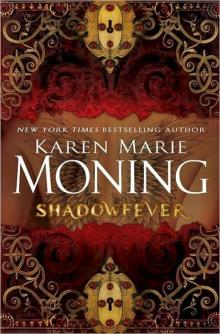 Shadowfever f-5
Shadowfever f-5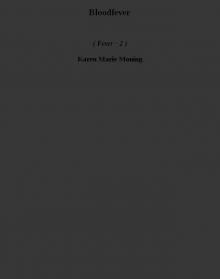 Bloodfever f-2
Bloodfever f-2